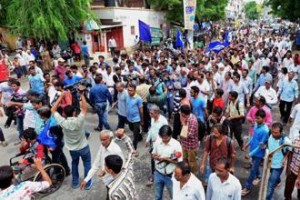Dalits give 30-day ultimatum to Gujarat BJP, threaten to block rail routes
 Una: Dalits in Gujarat on Monday gave the Bharatiya Janata Party (BJP) government in the state 30 days to meet their demands, failing which they said they will intensify their stir by blocking rail routes.
Una: Dalits in Gujarat on Monday gave the Bharatiya Janata Party (BJP) government in the state 30 days to meet their demands, failing which they said they will intensify their stir by blocking rail routes.
Jignesh Mevani, convener of the Dalit Atyachar Ladat Samiti (Dalit Committee to Fight Atrocity), said at a public gathering in Una that the BJP and Sangh Parivar should stop testing the patience of Dalits and agree to their 10 demands, including grant of 5 acres to each Dalit family in Gujarat.
Monday saw the end of a 350-km Dalit march from Ahmedabad to Una, the town where four Dalits were publicly flogged by alleged ‘cow protectors’ on 11 July over the skinning of a dead cow.
The 10-day ‘Dalit Pride’ march was joined by thousands from towns and villages along the way.
“We give a 30-day ultimatum to the government to meet our demands. This is elaan-e-jung (declaration of war). If they fail to do so, we will block rail routes. If a Patidar leader (Hardik Patel) can go to jail for nine months over demands of his community, I am ready to go for 27 months. When people from across the country will come out to support us, they will say they haven’t seen such a miserable model of development,” said Mevani. The crowd cheered when Mevani called for a jail bharo andolan, or a movement to court arrest.
Also read: Jignesh Mevani: Dalit leader who moves the masses
Mevani criticized Prime Minister Narendra Modi saying while he spoke on the Dalit issue, he has been silent on the death by police firing of three Dalit youths in Thangadh town of Gujarat in 2012.
At the meeting, attended by some 10,000 people, the national tricolour was unfurled by Radhika Vemula, the mother of Rohith Vemula-a Hyderabad-based Dalit student, whose suicide in January led to protests across the country against caste discrimination in education-and the father of one of the Una victims.
Also present were Kanhaiya Kumar, president of the Jawaharlal Nehru University students’ union, documentary film-maker Anand Patwardhan, Dalit activist Martin Mackwan and ex-police officer Rahul Sharma.
Mevani, a journalist-turned-human rights activist, criticized the state government for introducing a new land bill which does away with the consent clause for farmers whose land is being acquired, adding the Dalit protesters will also involve farmers in their fight for land rights.
The other key demands of the Samiti include alternative livelihood options, better policy and legal framework for protection against atrocities and prosecution of those involved in the Una incident.
In the towns and villages that the Dalit Pride march passed through, Dalits pledged not to continue with the hierarchical caste occupation, including disposing of dead cattle.
Also read: Who is a Gau Rakshak?
While Vemula said she is awaiting justice for her son’s death, Kumar contrasted the Dalit yatra with BJP patriarch L.K. Advani’s 1990 rath yatra, saying that while the former is aimed at bringing together various sections of society, the latter divided the nation.
“We will not go down your gutters and we will no longer take your dead animals,” Mevani said in his speech.
Bhikabhai Soundarva, general secretary of Meghvad Samaj, a Dalit community organization in Una, said he gave up lifting carcasses after the Una flogging.
“I used to trade in animal hides. But after the Una incident, I have stopped it and now I work as a farm labourer,” he said.
Soundarva, who hails from Motha village in Una, said the government gave land to 29 Dalit families in his village about 15 years ago for farming. But these land parcels were taken back by the state in 2015, he added.
Kalubhai Rathod, a former BJP legislator from Una, said the appeal to the deputy collector was issued by Congress legislator Punjabhai Vansh and that the BJP backs the Dalit demand for land. “We have supported the Dalit community in getting back land. The collector has given an order to this effect and very soon they will get ownership,” said Vansh.
Soundarva said untouchability is commonplace in Gujarat. “Even the sarpanch of our village, who is a Dalit, is served tea in a separate cup.”
According to a study carried out by the Robert F Kennedy Center for Social Justice and Human Rights and Navsarjan Trust in 2010, in 1,569 villages covering 98,000 respondents, 90% of villages in Gujarat face untouchability, with Dalits barred from entering temples.
The study looked at 90 forms of discrimination faced by Dalits in Gujarat. “If you blame Congress for non-implementation of land reforms for Dalits, then you have to give credit to the BJP for implementation of land reforms only for industries and non-farmers,” said Martin Mackwan, Dalit activist and founder of Dalit Shakti Kendra and Navsarjan Trust.
After the BJP came to power in Gujarat in 1998, laws introduced by the government to amend industrial policies have helped industry and non-farmers at the expense of Dalits in rural areas, he said. Earlier, non-farmers could not buy agricultural land and farmers could buy only in a radius of 8km from their existing land.
The BJP government has lifted this 8-km restriction.
Also, the process of converting farm land for other purposes was made easier by the BJP government. As a result, cases of land being given as dowry by farmers have shot up, with many doctors, lawyers and other non-farmers becoming land owners, according to Mackwan.
Meanwhile, a convention-United Dalits of India-has been called on 31 August in Rajkot to mobilize Dalits from across the country.
Source: Daily Hunt





